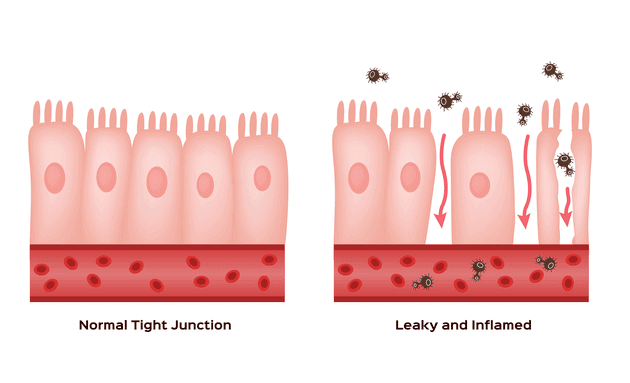Auto immune meaning
Autoimmune diseases are a group of conditions in which the immune system mistakenly attacks the body's own cells and tissues.
These conditions can affect various organs and systems, leading to chronic inflammation and a range of symptoms.
Understanding and managing autoimmune diseases is crucial for those who suffer from them as it can have a major impact on their quality of life.
I. Tackling Autoimmune Diseases Naturally
Managing autoimmune diseases naturally requires a comprehensive approach that takes into account lifestyle factors, dietary choices and, of course, intestinal problems and intestinal flora.
By understanding the underlying causes of autoimmune diseases and making targeted changes, people can often relieve their symptoms, reduce inflammation, and improve their overall health.

II. A link between leaky gut and intestinal flora on autoimmune diseases
Recent studies have shown a strong link between autoimmunity and gut health. In particular, inflammation of the gut, known as leaky gut, is in associated with an increased risk of autoimmune diseases.
In addition, the composition of the gut microbiota – the community of bacteria, fungi and other microorganisms in the gut – has been shown to play a role in the development of autoimmune diseases.
Pathogens such as parasites in the gut can cause damage to the intestinal mucosa, leading to a condition known as leaky gut.
Leaky gut, or intestinal permeability, occurs when the tight junctions between intestinal cells become weakened, allowing molecules that normally cannot pass through the intestinal wall to pass through.
This can lead to inflammation and trigger an immune response. Several studies have shown that people with inflammatory bowel diseases, such as Crohn's disease and ulcerative colitis, are more likely to develop autoimmune diseases.
The inflammation and increased intestinal permeability associated with these conditions are thought to lead to an overactive immune response, causing the body to mistakenly attack its own tissues and organs.
Elena Karnaukhova

III. Common autoimmune diseases and symptoms
A. Addison's disease:
Addison's disease occurs when the adrenal glands don't produce enough hormones.
Symptoms include fatigue, weight loss, low blood pressure, and dark skin.
Natural treatments for Addison's disease focus on hormone replacement therapy, stress reduction techniques, and a balanced diet.
B. Celiac Disease – Sprue (Gluten Sensitive Enteropathy):
Celiac disease is an immune response to gluten, a protein found in wheat, barley and rye.
The symptoms can include digestive problems, fatigue, weight loss, and nutrient deficiency.
To manage celiac disease naturally, follow a gluten-free diet, support gut health with probiotics, and supplement nutrient deficiencies.
C. Reactive Arthritis:
Reactive arthritis usually develops after an infection and causes joint inflammation.
Symptoms often include joint pain, stiffness, and swelling, along with possible involvement of the eyes and urinary tract.
Natural treatment for reactive arthritis may include an anti-inflammatory diet, light exercise, stress reduction, and natural pain-relieving measures.
D. Rheumatoid Arthritis:
Rheumatoid arthritis is a chronic inflammatory disease that affects the joints.
Symptoms include joint pain, swelling, stiffness, and fatigue.
Natural approaches to managing rheumatoid arthritis may include an anti-inflammatory diet, regular exercise, and stress management techniques.
E. Dermatomyositis:
Dermatomyositis is characterized by muscle weakness and skin inflammation.
The symptoms may include muscle pain, difficulty swallowing and a noticeable skin rash.
Natural treatment options for dermatomyositis include physical therapy, light exercise, an anti-inflammatory diet, and stress reduction techniques.
F. Graves disease:
Graves' disease is an autoimmune disease that affects the thyroid gland.
The symptoms can include hyperthyroidism, weight loss, anxiety, and eye problems.
Natural approaches to treating Graves' disease may include stress reduction, dietary changes (such as reducing iodine intake), and herbal remedies that support thyroid function.
G. Hashimoto's Thyroid Inflammation:
Hashimoto's thyroiditis is characterized by an underactive thyroid due to an immune system attack.
Symptoms often include fatigue, weight gain, hair loss, and depression.
Natural treatment strategies for Hashimoto's thyroiditis may include optimizing nutrition, managing stress, addressing nutrient deficiencies, and supporting thyroid health with herbs and supplements.
H. Multiple Sclerosis:
Multiple sclerosis affects the central nervous system, leading to communication problems between the brain and the rest of the body.
The symptoms can vary widely but include fatigue, muscle weakness, balance problems, and cognitive problems.
A natural approach to multiple sclerosis can include a nutrient-dense diet, regular exercise, stress reduction techniques, and targeted supplementation.
I. Myasthenia Gravis:
Myasthenia gravis causes muscle weakness and fatigue due to impaired nerve-muscle communication.
Symptoms often include difficulty speaking, swallowing, and muscle fatigue.
Natural treatment options for myasthenia gravis may include lifestyle modifications, stress reduction techniques, light exercise, and a balanced diet that supports muscle health.
J. Pernicious Anemia:
Pernicious anemia is characterized by a deficiency of vitamin B12, which affects red blood cell production.
Symptoms include fatigue, weakness, shortness of breath, and neurological problems.
Natural approaches to treat pernicious anemia include dietary changes, supplementing with B12, and addressing underlying gut health issues that affect absorption.
K. Sjogren's Syndrome:
Sjögren's syndrome affects the glands that produce moisture, leading to dryness of the eyes, mouth, and other parts of the body.
The symptoms are often dry eyes, dry mouth, fatigue and joint pain.
Natural strategies for managing Sjögren's syndrome may include optimizing hydration, using artificial tears and saliva substitutes, and incorporating anti-inflammatory foods into the diet.
L. Systemic lupus erythematosus:
Systemic lupus erythematosus (SLE) is a chronic autoimmune disease that can affect multiple organs and systems.
Symptoms can range from mild to severe and can include fatigue, joint pain, skin rashes, and organ involvement.
Natural approaches to managing SLE can include a healthy diet, regular exercise, stress reduction techniques, and natural anti-inflammatory supplements.
M. Type 1 Diabetes:
Type 1 diabetes is an autoimmune disease in which the immune system attacks the insulin-producing cells in the pancreas.
Symptoms include increased thirst, frequent urination, weight loss, and fatigue.
Natural treatment for type 1 diabetes includes blood sugar control, insulin therapy, a balanced diet, regular exercise, and stress management.

IV. Autoimmune disease symptoms, diagnosis and treatment
There is no standard approach to treating autoimmune diseases, but some natural treatments may include lifestyle changes such as dietary modification, nutritional supplements, stress reduction, and exercise.
In addition, some people find that herbal remedies, acupuncture, and other forms of traditional medicine can be helpful in managing autoimmune symptoms.
Natural treatments for autoimmune diseases can include strengthening your gut and intestinal flora.
Remove triggers and pathogens such as parasites, fungi and bad bacteria from your intestines.
Work with a specialist!
I work in my practice holistic. So the whole body is treated instead of parts of it.
V. Lifestyle and Diet
Adjusting lifestyle when dealing with autoimmune conditions, such as stress reduction, regular exercise and adequate sleep.
The importance of a well-balanced diet that focuses on whole, nutrient-dense foods and avoids potential triggers or allergens.
Specific dietary considerations, such as an anti-inflammatory diet or a gluten-free diet, based on the person's needs and condition.



- The role of microbiome in rheumatoid arthritis treatment
- Develop and grow yourself
- Lab studies
- Respiratory Therapy
- What is a New Age Child?
- Treat depression naturally
- Autoimmune diseases symptoms
- Auto immune meaning
- Autoimmune disease lupus symptoms
- Auto immune disease alternative treatment
- Auto immune disease hair loss symptoms
- Autoimmune disease symptoms





16 thoughts on “Auto immuun ziektes”
Hi Elena, I have Rheumatoid Arthritis, could I also have leaky gut? And what is the natural treatment?
Hi Lisa, that may be true but I need to know more about you. When did it all start, did you suffer from your intestines.
By the way, not everyone has problems with their intestines and can still have leaky intestines, which simply express themselves in other ways such as rashes, headaches,
inflammation, autoimmune diseases, etc. It is better to call me if you have any questions. Greetings
Elena
Pingback: Restoring intestinal flora after antibiotics | Restore intestinal flora naturally
Pingback: Parasites in your gut | Symptoms | Natural treatment
Pingback: Where do you feel sadness in your body | Let go of sadness and anger
Pingback: What is a New Age Child |
Pingback: Depressive symptoms | Depression symptoms woman
Pingback: H.Pylori, nausea, ulcer, fatigue. Of course. Maastricht
Pingback: Self-test iodine deficiency | Slow thyroid
Pingback: Respiratory therapy nearby | Breath therapy
Pingback: Persistent Major Depressive Disorder Treatment | Naturally
Pingback: Psychosomatic complaints child | What is a primary cause
Pingback: Leaky Gut Syndrome Symptoms | Leaky gut rash
Pingback: Leaky gut symptoms | Leaky gut therapy | Holistic approach
Pingback: Vitamin D deficiency symptoms eyes | Vitamin D deficiency anxiety
Pingback: Finding yourself again | Finding yourself therapy